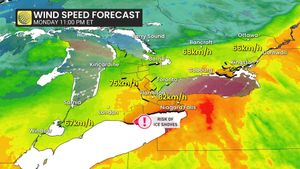IOWA CITY — The University of Iowa is taking steps to evaluate its use of the Macbride Nature Recreation Area (MNRA), which spans 485 acres and serves as a site for research, education, and naturalist activities. Under lease from the Army Corps of Engineers, the review process aims to balance the university's financial sustainability with the mission to provide educational resources. A dedicated committee leading this review is scheduled to submit its final report to UI President Barbara Wilson by May 1, 2023.
Last June, university officials pledged to engage with the community as part of the evaluation process, which many feel is necessary to guarantee transparency and inclusivity. On February 13, the university opened channels for feedback, allowing campus community members to submit their input via email by March 14, 2023. This move follows concerns from local figures about the apparent lack of public forums for discussion on the future of the MNRA.
Connie Mutel, a retired senior science writer with roots at the university’s IIHR-Hydroscience & Engineering laboratory, expressed her worries about the engagement process. “I haven’t known how to respond to inquiries concerning public input,” she wrote, highlighting the significance of clear opportunities for the community to voice their opinions. “An appearance of secretive proceedings cannot serve the UI well.”
Mutel emphasized the necessity for community members to be heard, particularly when decisions made about the MNRA can impact education and public resources. “Iowans rightly view the UI as a public institution, paid for by taxpayers, focusing on teaching, research, and public service,” she said, advocating for transparency.
The review of the MNRA lease is particularly significant following the university’s previous decision not to transfer over $1 million of MNRA usage costs from the College of Education to the general fund. College of Education Dean Daniel Clay described this decision as “disappointing but understandable” due to institutional priorities and limited funding.
Initially, there were rumors about the university potentially notifying the Corps of Engineers about not continuing its lease when it expires in 2029. Clay, when queried, stated, “I do not know if a final decision on [the lease] has been made by the university or not.” The current lease includes provisions allowing the university to exit if provided with three years' notice.
The long-standing use of the MNRA, established since the 1960s, is interwoven with programs such as the School of the Wild and the Iowa Raptor Project, which provide transformative educational experiences to thousands of children each year. The facility's role transcends simply being a recreational area; it's integral to the community and the University of Iowa's outreach initiatives. Mutel asserts, “Transformative experiences are enhanced by MNRA’s ancient plant communities surrounded by expansive waters and vistas.”
Despite its significance, the university's revised budget plan has put the future of the MNRA under scrutiny. Following destructive events like the 2020 derecho and the fire incident at the Iowa Raptor Center, maintenance costs have increased. Community members and experts are concerned about what may happen if the university decides to withdraw from the lease.
Bradley Freidhof, interim director of the Johnson County Conservation Board, echoes these concerns, calling for innovative solutions and collaboration. “Where is the ingenuity and innovation? What has been done to explore collaborative learning opportunities?” he questioned, emphasizing the need for partnerships to leverage resources and keep the MNRA viable.
Freidhof proposes involving local educational programs to address maintenance issues, showcasing how community-linked projects could benefit both the university and the region. For the long-term vision of the MNRA, he advocates for engaging students, faculty, and community members to promote physical and mental well-being through accessible natural spaces.
While the university moves forward with its review, the community's input proves invaluable. Members are encouraged to contribute their perspectives by emailing [email protected] before the March 14 deadline. The impending report aims to reflect both financial realities and the community’s needs, underscoring the importance of engaging the public throughout this process.
Reflecting on the necessity of the Macbride Nature Recreation Area, discussions around budgetary concerns and community significance necessitate the inclusion of all stakeholders—academic, local government, and citizens alike. The upcoming recommendations could reshape how the university interacts with this unique environmental resource, making it more aligned with community expectations and educational aspirations.



